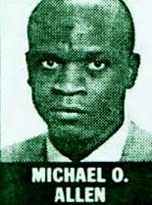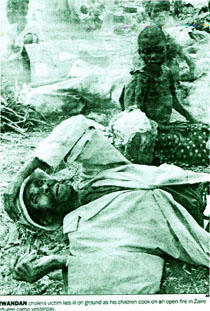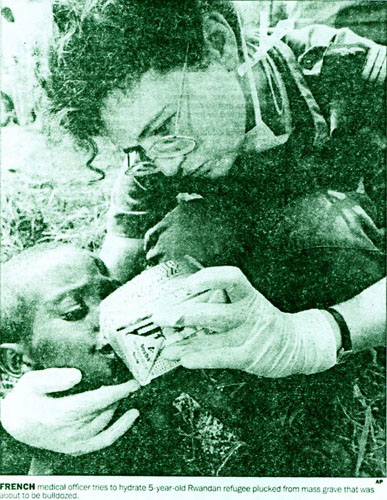
by MICHAEL O. ALLEN, Daily News Staff Writer | Wednesday, July 27, 1994
GOMA. ZAIRE – Her tiny torso was wrapped in dirty rags. No one knew her name, where she came from or what became of her parents. She could not have been more than 6 months old.
Last week French soldiers at Goma airport handed the baby to Florence Nirere, a 15-year old Rwandan refugee whose parents were killed fleeing tribal warfare in their homeland.
Nirere had no food, but she struggled to keep the child alive by giving her water.
Yesterday, Nirere frantically shook the tot limb-by-limb as I rode with them in a truck to a refugee orphanage at Camp Carea. She checked her mouth and eyes, looking for any sign of life.
“The baby is dead,” Nirere finally announced, as she dropped the infant’s lifeless arm.
I stared at Nirere’s skirt, which was caked with dirt from a three-month trek.
The dirt was mixing with a sickening yellow fluid that oozed from the baby as its short life expired.
Nirere and the dead baby were among 24 orphans crammed into the truck yesterday as it bounced along the dirt road.
Clad in filthy rags and weakened from hunger, heartbreak and illness, the children stared listlessly. Most seemed oblivious to the shroud of death around them.
Thousands of Rwanda’s children will die anonymous deaths, nameless victims of illness and civil war.
Tens of thousands will be orphaned either by the horrific tribal genocide that erupted in April in this small
impoverished African nation or by the plague of cholera that has swept the refugee population.
Some have been abandoned by parents too sick to care for them, others simply got lost in the almost biblical exodus from Rwanda.
At Camp Carea, about 200 devastated children yesterday wept for their parents.
“They cry for their mom and dad,” said Nimet Lalani, the lone doctor at the Ndosho orphanage.
Dr. Alphonse Toko said most of them are sick–about 40% are suffering from the same cholera that has ravaged Rwandans young and old.
At Camp Kibumba, the group Doctors Without Borders found a pile of 600 bodies yesterday.
“The doctors were just in tears,” said Anne Marie Huby, a spokeswoman for the group. “The death rate is steady, if not worse.”
Every day relief agencies send trucks into the streets of Zaire to round up unaccompanied children and take them to orphanages.
Yesterday, I watched 15 children as they slept and played around tents in the UNICEF yard.
At the Ndosho orphanage, it was hard to tell which of the 4,000 children were sick and which were healthy.
Just a week ago, the Ndosho orphanage housed 40 Zairean kids.
But then Gisenyi, the last stronghold of the Rwandan gOvernment, fell to the rebels.
About I million Rwandans–a procession to a death perhaps more certain than the one they feared when they fled their villages–struck like locust across the land.
They uprooted trees in their path for firewood, pitched tents wherever fatigue found them. And, when cholera took hold, they died a long the roadways.
Most of their orphans ended up in Ndosho, where nine died yesterday and 55 died during the week.
John Williamson, a UNICEF child psychologist, said he expects the situation to worsen, at least in the short run.
“With the fragility of the situation,” he said. “We can expect the number to grow to more than 50,000 orphans.”
Yesterday a persistent wail rang out from the children in Ndosho. Most were younger than 4. And they appeared to
harbor wounds far deeper than the physical ones I could see.
Many we’re naked. Others wore strips of dirty clothes. Some sat in their own feces while waiting to be cared for.
Related: Refugees are dying too fast to be buried
Leave a Reply